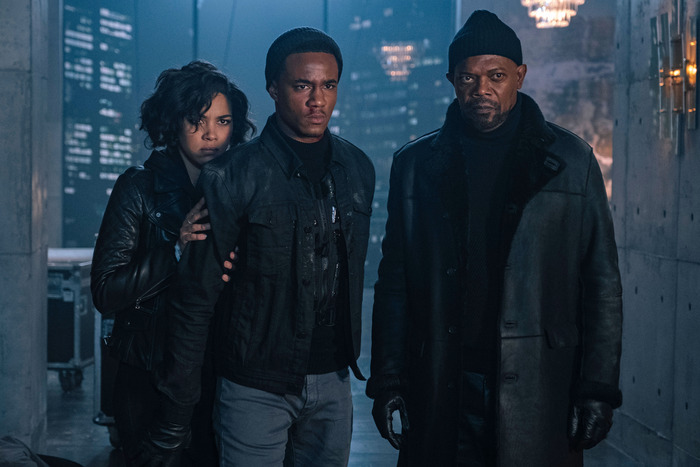Shaft (2019)

This latest reboot/sequel in the Shaft series feels like an oddity – part mismatched buddy movie, part throwback action flick. It never quite comes together satisfactorily, but Samuel L. Jackson’s presence means that it’s always watchable, even if instantly forgettable.
Premise: When his best friend is found dead from a drug overdose, FBI data analyst “JJ” Shaft Jr (Jessie Usher) suspects foul play. Soon finding himself out of his depth when he starts his own off-the-books investigation, JJ is forced to turn to his estranged father, private investigator John Shaft II (Samuel L. Jackson), for help.
Review:
The three original Shaft films (1971-1973) starring Richard Roundtree as private investigator John Shaft were ground-breaking for their time, and are arguably the most famous examples of the Blaxploitation sub-genre. The 2000 reboot/sequel (also called Shaft) starred Samuel L. Jackson as the nephew of the original John Shaft, and concerned a racially-motivated murder committed by an “untouchable” son of a wealthy white family. Jackson was surrounded with a great supporting cast, including Christian Bale, Toni Collett and Jeffrey Wright, and the end result was a solid thriller, if not an all-time classic.
This 2019 reboot/sequel (also confusingly called Shaft) is nowhere near as good or memorable as any of the previous versions, and it does beg the question, “why?”. The film itself seems uncertain what tone it wants to strike, or even what point of view it is coming from.
“…an odd-couple action comedy, but neither the action nor the comedy work particularly well…”
The film opens in 1989 with a flashback to when Shaft (Samuel L. Jackson) was still a cop, and it shows why his then-wife Maya (Regina Hall) felt the need to leave with his infant son JJ after an attempted assassination puts their lives in danger. This opening scene is obviously shown from Shaft’s perspective, establishing that he did not deliberately walk out on his family.
The events then spool forward (including a recap of 2000’s Shaft) to the present day, when the now-adult JJ (Jessie Usher) is a rookie FBI data analyst (and not, as he repeatedly reminds his friends, an actual field agent). The next half an hour or so is shown entirely from JJ’s perspective, as we see how he has grown up without really knowing his father, and has made a life for himself with his friends Sasha (Alexandra Shipp) and Karim. When Karim is found dead, JJ suspects he was murdered, but the cops aren’t interested in investigating an ex-junkie's overdose.
“…Shaft in this film is a dinosaur…”
It’s at this point that the two worlds collide, when JJ is forced to “hire” his father Shaft as a private investigator to help him look into Karim’s death. The film then becomes an odd-couple action comedy, but one where neither the action nor the comedy work particularly well. Part of this may be due to the slightly confused tone, where it’s never entirely clear whether the audience should be relating to JJ or Shaft.
Shaft in this film is a dinosaur, with severely outdated ideas about race, gender and sexuality. He’s not quite become the “racist/homophobic old man” stereotype (as he is trying to understand the changing social and political attitudes), but he’s really not far off. What’s not clear is whether the audience is meant to side with him (as he rails against “political correctness”) or against him (for example, when he offensively questions whether JJ “likes p***y” after hearing how close JJ was to his friend Karim). Is the film saying that the millennial JJ needs to toughen up and be more of a “real man” life Shaft, or is the film saying that Shaft has become a relic that needs to move with the times? I guess the film is trying to say that JJ and Shaft can both learn from each other?
“…feels like the characters are being forced into the ‘Ride Along’ buddy-action-comedy template…”
Overall, the film feels like a tries to do a lot, but doesn’t do a lot of it successfully. For example, in one scene Alexandra Shipp’s character Sasha tells herself not to do what a “simple b***h” in a movie would do, and you think the film is trying to write a smart, strong female character … but then a few moments later she still gets herself captured and turned into the damsel in distress. The film tries to be a buddy-comedy, but (a few amusing lines of dialogue aside) most of the jokes fall pretty flat. Even as an action-thriller, the action has a very tame, made-for-TV feel, and the central mystery is pretty basic. This film is from Tim Story, the director of Ride Along, Ride Along 2 and the forthcoming Ride Along 3, and I couldn’t help but feel the whole project felt like the Shaft characters were being forced into the Ride Along buddy-action-comedy template...
But despite all that, this latest Shaft is far from unwatchable. Samuel L. Jackson’s natural charisma papers over a lot of the cracks, and Jessie Usher gets more to work with here playing Samuel L. Jackson’s son that he did when playing Will Smith’s son in Independence Day: Resurgence. Also making a welcome cameo is Richard Roundtree, appearing as the original John Shaft Sr (revealed in this to be Samuel L. Jackson’s character’s absent father, rather than his uncle as stated in the 2000 film). In the end, this film is more of a novelty than a must-see, but if you’re curious about seeing where they’ve taken the Shaft franchise, this could still be worth a watch as long as you keep your expectations low.






